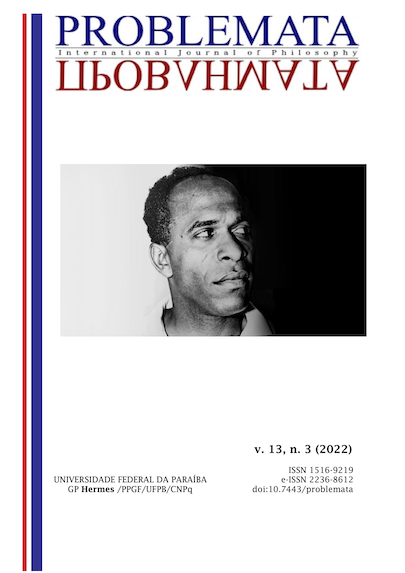THE COLONIAL TRAUMA IN THE PSYCHIC CONSTITUTION OF THE VERY FIRST BLACK CHILDHOOD
DOI:
https://doi.org/10.7443/problemata.v13i3.65085Keywords:
Colonial trauma, Early childhood, Psychic constitution, DecolonialityAbstract
Based on the category “colonial trauma”, central to Fanonian studies of analysis of contemporary racialized society, this article aims to raise reflections on the place of psychic and subjective constitution of black children from 0 to 3 years of age in the context of expressive racist and infanticidal necrophilia. In the dialogue with Winnicott's classical thought about the constitution of the child's psyche, Fanon's work is inserted as an indispensable optics for analyzing the basic precepts present in the most subtle and violent processes of subalternization of the black body in its first contact with the white anti-black world or even in uterine life, in the expressive obstetric violence against black women. In this process of analyzing the psychopathologization of black childhood, authors such as Grada Kilomba and Wallace de Moraes are theoretically integrated into the reflection, expanding our reading of this expressive and violent phenomenon against the black child’s bodies in a state marked by racism and the coloniality of power.
Downloads
References
CURI, Paula Land; RIBEIRO, Mariana Thomaz de Aquino; MARRA, Camilla Bonelli. A violência obstétrica praticada contra mulheres negras no SUS. Rio de Janeiro: Arquivos Brasileiros de Psicologia, 72 (no.spe.): 156-169, 2020.
CAMBUÍ, Heloísa; NEME, Carmen; ABRÃO, Jorge. A constituição subjetiva e a saúde mental: contribuições winnicotianas. Rio de Janeiro: Ágora, v. XIX, nº1, jan/abril, p. 131-145. 2016.
FANON, Frantz. Peles Negras, Máscaras Brancas. 1a ed. São Paulo: Ubu Editora, 2020.
FANON, Frantz. Alienação e liberdade: escritos psiquiátricos. São Paulo: Ubu Editora, 2020.
FALK, J. (org). Educar os três primeiros anos: a experiência de Lóczy. 2. ed. São Paulo: Junqueira & Marin, 2016.
KILOMBA, Grada. Memórias da plantação: Episódios de racismo cotidiano. Rio de Janeiro, RJ: Cobogó. 2019.
LIMA, Fátima. Trauma, colonialidade e a sociogenia em Frantz Fanon: os estudos da subjetividade na encruzilhada. Rio de Janeiro: Arquivos Brasileiros de Psicologia, 72 (no.spe.): 80-93, 2020.
MORAES, Wallace de. Crítica à estadolatria: contribuições da filosofia anarquista à perspectiva antirracista e decolonial. São Paulo: Teoliterária V. 10 - N. 21 – 2020.
MORAES, Wallace de. As origens do necro-racista-estado no brasil: crítica desde uma perspectiva decolonial & libertária. Rio de Janeiro: REL (UFRJ) Vol. 2, 2020.
NOGUERA, Renato. Fanon: Uma Filosofia para Reexistir. In: FANON, Frantz. Alienação e Liberdade: Escritos Psiquiátricos. São Paulo: Ubu Editora, 2020. p. 7 - 19.
SOUZA, Macelle. 'As crianças negras são mais punidas do que as brancas', diz pedagoga. São Paulo, UOL. 2016.
TISSER, Luciana. Transtornos Psicopatológicos na Infância e na Adolescência. 1. ed. Novo Hamburgo: Sinopsys, 2018.
Downloads
Published
Issue
Section
License
Copyright (c) 2022 Carlos Côrtes

This work is licensed under a Creative Commons Attribution 4.0 International License.
Authors who publish with this journal agree to the following terms:
- Authors retain copyright and grant the journal right of first publication with the work simultaneously licensed under a Creative Commons Attribution License that allows others to share the work with an acknowledgement of the work's authorship and initial publication in this journal.
- Authors are able to enter into separate, additional contractual arrangements for the non-exclusive distribution of the journal's published version of the work (e.g., post it to an institutional repository or publish it in a book), with an acknowledgement of its initial publication in this journal.
-
- Authors are permitted and encouraged to post their work online (e.g., in institutional repositories or on their website) prior to and during the submission process, as it can lead to productive exchanges, as well as earlier and greater citation of published work (See The Effect of Open Access).





